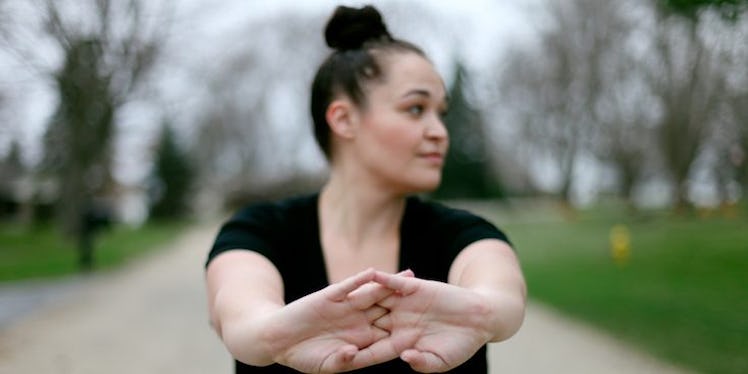
This Is The Ideal Temperature You Want Outside When You're Going For A Run
Whether you're a routine marathon runner, or you simply enjoy the occasional light jog, there's no denying that a gorgeous, sunny day can motivate just about anyone to get out there and pound the pavement.
But wonderful weather certainly has different definitions across the board. Some people might like it toasty AF, while others prefer to get their jog on when it's a bit colder, and they can feel the chilly wind blowing through their hair.
Despite individual preferences, there have been plenty of attempts in the scientific community to figure out just what exactly the ideal temperature is for a good, outdoor run.
But first, let's talk about how the weather actually affects your body when you exercise outside.
If you're the type of person who enjoys hitting the track in a heat wave, you may be putting a few things at risk when it comes to your running performance.
When it's too hot, you're bound to sweat a lot, which can, unfortunately, lead to some majorly debilitating dehydration.
In fact, when you run in really hot weather, you may actually lose as much as much as two percent of your body weight just from your sweat alone, which is pretty mind-blowing, when you think about it.
On the other hand, all you winter-lovers aren't exactly in the clear either.
Running in colder temperatures forces the body to rely more on carbohydrates for energy. This newly demanded fuel source drains energy reserves faster, especially on long runs.
So what exactly is that sweet spot when it comes to going for an outdoor run?
Believe it or not, there actually is a "just-right" temperature to look for, but it actually depends on the type of running you'll be doing.
After reviewing weather and race data from past Olympic events, researchers from the University of Tulsa used the information to determine what the best outdoor weather temperature is for optimal running performance.
Interestingly enough, the results differed between marathon runners and sprinters.
When it came to running marathon-like distances, 49.4 degrees Fahrenheit was found to be the ideal temperature for men, while 51.8 degrees Fahrenheit proved best for women.
The sprinters, however, were able to fare better in warmer weather. For example, in the 100-meter dash, men performed best when the temperatures were at around 72 degrees Fahrenheit, and women similarly preferred a temperature closer to about 73 degrees Fahrenheit.
So, basically, the more distance you have to run, the cooler you're going to want it to be outside.
This is because, when you lace up your sneakers to go for a jog, your body begins to build heat, which then dissipates as you start to sweat.
If it's too hot outside, it makes it that much harder for your body's cooling mechanisms to work properly. The cooler temperatures provide a happy medium for that hard-working bod of yours.
Another study out of France analyzed the finish times at six major marathons over the course of 10 years, confirming the coolness craze among runners.
Their results closely coincided with the Tulsa trials, concluding that an approximate 44 degrees was ideal for women looking to excel in long-distance running.
So, when you think of the "perfect day," 45 degrees and overcast skies may not be the most dazzling image that immediately comes to mind.
But if you really want to crush your next run, you might want to hold out for that mildly mediocre forecast.